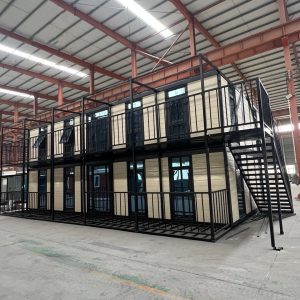In today's rapidly urbanizing world, the construction industry is facing unprecedented challenges and opportunities. How to improve construction efficiency, reduce costs and minimize environmental impact while maintaining building quality has become an urgent issue in the construction field. Prefabricated houses, as an innovative construction method, are leading the change of the construction industry and injecting new vitality into the process of urbanization with its high efficiency, environmental protection and flexibility.

Definition and advantages of prefabricated houses
Prefabricated housing, also known as assembly building, is a new type of construction method in which the components of a building are pre-produced in a factory and then transported to the construction site for assembly. This mode of construction has significant advantages over traditional construction methods:
Efficient and fast: the components of prefabricated houses are made in factories through standardized and assembly line production, which greatly shortens the construction period. Simple assembly on site is all that is required to form a complete building structure, significantly improving construction efficiency.
Controllable quality: Factory production facilitates the implementation of strict quality control standards to ensure the dimensional accuracy, material quality and performance consistency of each component. This greatly reduces the quality risks associated with on-site construction due to material and process issues.
Energy saving and environmental protection: Prefabricated houses can reduce material waste and energy consumption during the production process. At the same time, the noise and dust pollution at the construction site are also significantly reduced, in line with the concept of green building.
Cost saving: Scale production and standardized design help reduce costs and improve economic efficiency. In addition, the rapid construction of prefabricated houses reduces labor and time costs.
Flexibility: Prefabricated houses come in a variety of designs and can be customized to meet customer needs. Whether it is residential, commercial buildings or public facilities, it can meet different needs of use.

The innovative practice of prefabricated houses in improving the efficiency and quality of construction
Standardized design and production: prefabricated houses adopt standardized design, which makes each component interchangeable and universal. This not only improves production efficiency, but also facilitates later maintenance and upgrading. At the same time, the standardized design also ensures the stability of building quality.
Advanced manufacturing technology: The production process of prefabricated houses adopts advanced manufacturing technology and techniques, such as automated production lines and CNC machining. The application of these technologies improves production precision and efficiency, and also ensures the quality of components.
Intelligent construction management: Intelligent construction management methods, such as BIM (Building Information Modeling) technology and Internet of Things (IoT) technology, are used in the construction site of prefabricated houses. These technologies make the construction process more transparent and controllable, effectively reducing construction risks and quality problems.
Application of green building materials: prefabricated houses focus on environmental protection and sustainability in material selection. By using green building materials, such as recycled materials and low-carbon materials, the impact of construction on the environment is reduced. At the same time, these materials improve the durability and comfort of the building.
Modularity and Expandability: The modular design of prefabricated houses makes the building expandable and flexible. Users can increase or decrease functional modules according to actual needs to meet different usage requirements. This design not only improves the utilization rate of the building, but also reduces the transformation cost.
Prospects and Challenges of Prefabricated Houses in the Process of Urbanization
With the acceleration of urbanization and the improvement of people's requirements for the living environment, prefabricated houses have a promising application in urban planning, residential construction, commercial construction and other fields. However, the development of prefabricated houses also faces some challenges:
Low public awareness: Some members of the public do not have high awareness of prefabricated houses and have doubts about their quality and performance. It is necessary to enhance public awareness and acceptance by strengthening publicity and education.
Imperfect technical standards and norms: At present, the technical standards and norms of prefabricated houses are not perfect, resulting in uneven product quality in the market. This requires the development and improvement of relevant technical standards and norms to ensure product quality and safety.
Transportation and Installation Costs: The components of prefabricated houses need to be transported to the construction site for assembly, which increases transportation and installation costs. Therefore, transportation and installation processes need to be optimized to reduce costs.
Improvement of innovation ability: With the intensification of market competition and the diversification of consumer demand, prefabricated housing enterprises need to continuously improve their innovation ability and develop more products that meet market demand.
In summary, prefabricated houses, as an innovative construction method, play an important role in improving construction efficiency and quality. However, its development also faces some challenges. In the future, the joint efforts of the government, enterprises and society are needed to promote the healthy development of the prefabricated housing industry and inject more vitality into the urbanization process.
Contact me if you are interested:uwantvlink@gmail
Click here to visit the factory:https://www.youtube.com/watch?v=v3ywS6Ukzpc
Post time: 10-25-2024







